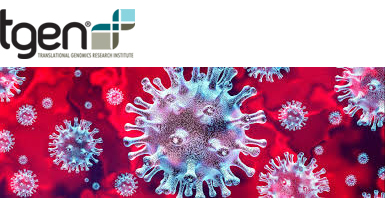TGen is combating Coronavirus: Smarter treatments. Better outcomes.

TGen, an affiliate of City of Hope, has been closely monitoring the outbreak of the novel strain of coronavirus, now officially called COVID-19 virus. Cases of COVID-19 have been identified in the United States, along with some localized spread in limited regions of the country.
To date, there have been two cases documented in Arizona, however the limited testing capacity in the state reduces our understanding of any potential local community spread.
While we are widely known for our work in cancer and neurogenomic research, we also are international leaders in genomics-based Public Health activities investigations, having solved a number of local, national and global disease outbreaks over the past decade.
TGen’s past work in safeguarding the health of Arizonans includes solving disease outbreaks and building genomic surveillance and detection systems. This work includes designing rapid, highly accurate and cost-effective tests for critical pathogens —such as Valley Fever, MRSA and other hospital superbugs, influenza, tuberculosis — finding and describing new disease pathogens, and detecting outbreaks at the earliest possible timepoints and tracking the evolution of these pathogens.
During the 2009 flu pandemic (aka the swine flu), TGen identified the first cases in Arizona, as the U.S. Centers for Disease Control and Prevention (CDC) did not have a test available for states to use at that time.
Our work with U.S. Food and Drug Administration (FDA) and the CDC in the development of the national Public Health genomics capacity includes TGen’s selection as one of the first four sites in the nation to start FDA’s food-borne disease genomic sequencing and participation on the CDC’s Blue-Ribbon Commission to develop genomics capabilities for the federal and state public health system.
Beyond preparedness, scientists in our Pathogen and Microbiome Division at TGen North are actively responding with local, state, national and international health officials to rapidly employ expertise and the latest technology to address this most recent public health issue.
We have rapidly developed and are currently using an exacting genetic-based test that can help physicians quickly identify who is infected with the COVID-19 virus. This test is being used to screen patient samples around the state to detect any circulating virus. It is also being submitted to the FDA for rapid approval and will be able to be used directly for patient health in AZ and elsewhere.
I am sure you’re keeping up with the latest developments through the myriad of media channels available today, but I wanted to personally let you know that TGen is in your corner and fighting.
Our scientists jumped into action on Day One, initiating development of new tests and other technologies that can rapidly detect and characterize the COVID-19 virus in the state’s hospitals, doctors’ offices and communities.
Finally, there are many things all of us can do to protect ourselves and our loved ones:
- Avoid close contact with people who are sick.
- If you are sick, especially with a respiratory illness or fever, stay home for at least 24 hours after symptoms clear.
- Avoid touching your eyes, nose, and mouth with unclean hands.
- Wash your hands often with soap and water for at least 20 seconds (Technique Matters!).
- Use an alcohol-based hand sanitizer that contains at least 60% alcohol if soap and water is not available.
- Before traveling, check for advisories from the CDC
- Stay informed from trusted sources like the CDC and the WHO and help distribute accurate and informative information to friends and family
We are all in this together and TGen is proud to be part of the overall response to this global health emergency.
Sincerely,

Dr. Jeffrey Trent
TGen President and Research Director
TGEN: THE NEW FACE OF GENOMICS
TGen officially launched in June 2002. Arizona Public Service provided interim office space to TGen for administrative offices in the Arizona Center. Banner Health System, in partnership with Quest Diagnostics, donated temporary lab space in their Tempe facility. During that time, the City of Phoenix began moving forward with its development of the Phoenix Biomedical Campus, a 15-acre research and education project located in downtown Phoenix, which would house TGen and other bioscience entities.
Nearly 18 months after breaking ground, TGen moved into its state-of-the-art headquarters. Officials from TGen and the City of Phoenix joined with Senator Jon Kyl, Governor Janet Napolitano, Mayor Phil Gordon, and more than 500 guests to celebrate the building dedication and ribbon cutting in March 2005. Dr. Francis S. Collins, director of the National Human Genome Research Institute, delivered the keynote address.
Today, the biomedical campus is an integral piece of the statewide bioscience initiative as the faculty contribute significantly to biomedical discoveries, the quality of health care for Arizona’s residents and the expansion and diversification of the state’s economy. The campus provides a unique, energetic environment that attracts biotech and related companies to Phoenix and Arizona through business opportunities in R&D, collaboration, partnering, and office expansion. Learn more about TGen: www.tgen.org
